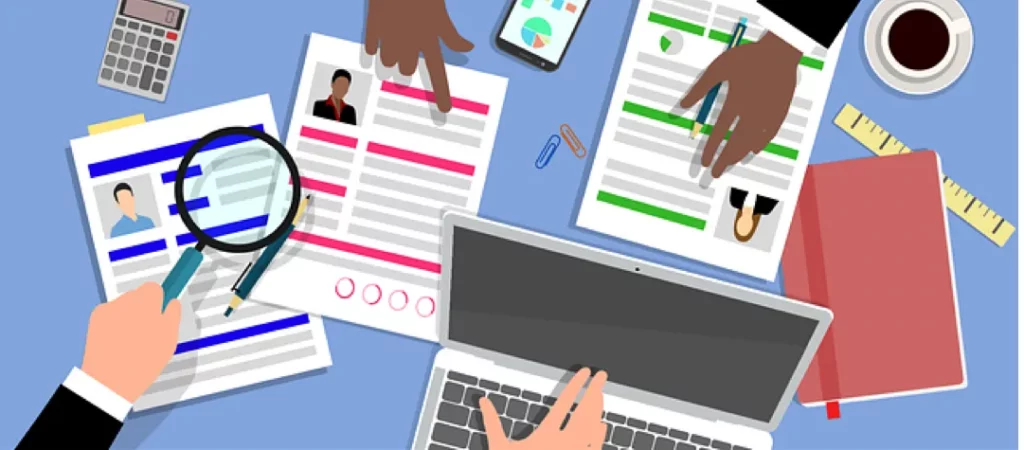Background checks can be completed in minutes or days depending on the information and data sources. This guide will provide all details regarding the background check process.
Some applicants are nervous about background checks during a recruitment process. Others are excited.
The job background check is an essential part of any recruitment process. Let’s learn more about the background check process and the steps that it involves.
What is a Background check?
The background check, as its name suggests, is a process to verify the professional and personal history of an applicant. The recruiter will review all your information and, if necessary, connect with previous employers or other sources to obtain a detailed report.
This is an essential part of any recruitment process to ensure a responsible and healthy workforce. It is advisable to include your professional history as part of the application process in order to ensure a smooth background check.https://www.amsinform.com/wp-content/uploads/2022/08/12.png
Factors Considered in Background Checks
While background checks can vary depending on the job you are applying for, there are three important things every employer should consider before they sign you up.
- History of Employment
- Credit history
- Education History
All educational degrees listed in your resume will be verified by the employer. To avoid any discrepancies, it is important to be truthful about your education details. Your employer will also ensure that all professional experience points are accurate and relevant.
If necessary, verify that all details are accurate and supported by appropriate proof. To ensure financial stability and credibility, some companies check applicants’ credit histories.
Policies and background check procedures change depending on where you are located in the United States. To estimate your chances of being selected, ensure that you have checked the background checks for your target company.
Background checks can be performed for employment of various types. The turnaround time will depend on the data source limitations and the type of information requested. You can see the average background check turnaround time here:
Your background check time can vary depending on the location of the company and the number of applicants. It is important to be flexible with the timeframe and to have patience in order to receive your final results.
If Your Background Check Takes Time
If your background check takes longer than two weeks, it could be a problem. Your background check may have taken longer than two weeks. It’s possible your recruiter rejected your application. If this happens, your recruiter will contact you to clarify details.
Background check companies can also cause delays as they have many tasks to handle. You should be patient for a few days, even after the estimate time.
There are also possibilities that recruiters may have done a background check, but were unable to make a final decision. This issue can be caused by the number of applicants. It is important to resolve this issue quickly.
Reply to Your Recruiter
Background checks can take longer than expected, so you may not receive an immediate call. If you don’t receive an update within a week, feel free to send another email.
If you do not receive a response, it is likely that your employer is still involved in background checks of applicants. You should wait at least one week before you contact your employer again for more details.
What If Your Background Check Is Wrong?
First, your recruiter must provide you with a report on your background check. You can then ask your background check provider to re-investigate the results. You might be asked by the company to verify your information or provide additional details.
They will be able to correct any incorrect information provided with proof. After this process, you will receive a new background report that can be sent directly to your recruiter.
Are Background Check Delays Possible?
Background checks can sometimes be delayed for many reasons. Due to the large number of applicants and long processes, it can take several days to get a job. Even if you are shortlisted for the interview round, it is possible to have to wait. The following are the reasons background checks can take longer than expected:
- International experience
- Multiple Residences
- These guidelines can help applicants avoid delays:
- Sign Release Forms and Authorizations
- Give accurate information
Also, you can first contact the person responsible for the background check process at the company in which you applied for a job. If you don’t get a response, you can contact the company responsible for background checks if they have your contact information.
What is the Employee Background Verification Process? How long does it take?
A background check is an in-depth screening of the candidate’s academic records, work history, credit scores, and college certificates.
It usually takes 3-10 days. It can take longer if the company needs to look into your past (mostly for senior-level hires).
Most companies conduct background checks on applicants after they have interviewed you.
What information can be found in a background check?
Companies conduct background checks to verify your identity before offering you a job.
Public records – Companies have easy access to your criminal history and court records from any law enforcement agency.
Your work history – Companies will search your past employers and dates of employment, as well as your roles in each company. They also look into your pay history, performance history, conduct, and other details. Don’t forget about the results of your drug tests!
Education records – Companies may reach out to universities to verify your credentials. This is because fake grades, fake certificates, and forging degrees are all common forms of corporate fraud.
Address verification – Who lies about their address? Those who try to conceal their past are the ones you want.
What is Background Verification in India?
Background Verification is initiated by companies calling your previous employer. They will compare the information you provided with data from your previous company.
Next, companies search public criminal records (or public databases) to find any illegal activity. They then look into your education records to confirm your certificates and degrees.
Last but not least, companies will verify your address. Sometimes, companies will even send someone to check out the address of a candidate.
Different companies in India conduct background checks in different ways. Here’s how they do this:
Most small and medium businesses have an HR department that handles all of the work.
Before offering a job, PSUs or government firms conduct extensive background checks.
PSUs will first ask for proof of residency proving that you have lived in your home for more than six months within the last four years.
You will also need to provide proof of your current permanent address and local address.
The company will request your records from the District Magistrates and Police Commissioners in the areas you reside.
One of these authorities may ask police stations to conduct the check.
The record that the police find is finally moved up the chain.
All these checks are mostly in common for opening a bank account, getting a credit card, or taking a home on rent in big cities like Mumbai. So, if you have a clean record, sit back and let your future employer do all the work.


















